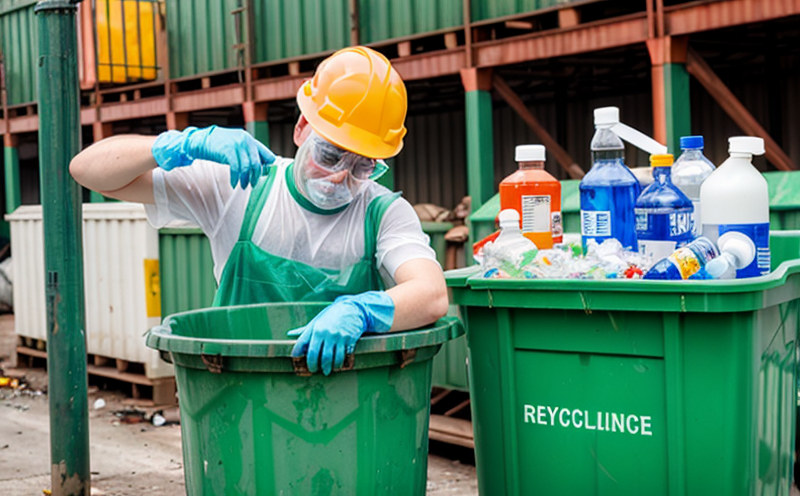ISO 18287 Chemical Testing of Solid Waste for Organic Compounds
The ISO 18287 standard provides a comprehensive framework for the chemical analysis of solid waste to identify organic compounds. This service is particularly relevant in sectors dealing with hazardous and non-hazardous waste management, recycling industries, and environmental compliance. Understanding the types and concentrations of organic compounds present in solid waste is crucial for preventing contamination of soil, water sources, and air.
The testing process involves several critical steps to ensure accurate results. The first step is the proper sampling and preparation of the solid waste specimen according to ISO 18287 guidelines. This ensures that the sample accurately represents the characteristics of the entire batch of waste. Once prepared, the specimen undergoes a series of chemical analyses using advanced instrumentation such as gas chromatography-mass spectrometry (GC-MS) and high-performance liquid chromatography (HPLC).
The analysis focuses on identifying specific organic compounds that may pose environmental or health risks. Common compounds targeted include polycyclic aromatic hydrocarbons (PAHs), polyaromatic ethers, phthalates, and other persistent organic pollutants (POPs). The detection limits of the instrumentation used are extremely low, allowing for precise quantification even at trace levels.
The testing process is meticulously documented to ensure transparency and reproducibility. Each step from sample collection to final analysis is logged, ensuring that all stakeholders can verify the integrity of the data. The results are presented in a comprehensive report detailing the types and concentrations of organic compounds detected, along with any potential risks they pose.
Understanding these organic compounds is not only important for regulatory compliance but also for informed decision-making in waste management strategies. By identifying problematic compounds early on, businesses can implement targeted remediation efforts or adopt more sustainable recycling practices. This service supports the circular economy by promoting the efficient use of resources and reducing environmental impact.
The importance of this testing cannot be overstated, especially considering the increasing emphasis on sustainability and environmental protection. Regulatory bodies like the European Union's Waste Framework Directive require such analyses to ensure that waste is managed in an environmentally friendly manner. This service helps organizations stay ahead of regulatory changes and maintain a competitive edge by ensuring they are compliant with international standards.
Why It Matters
The identification and quantification of organic compounds in solid waste through ISO 18287 testing is essential for several reasons. Firstly, it helps ensure compliance with environmental regulations, which can prevent costly fines and reputational damage. Secondly, it aids in the safe handling and disposal of hazardous materials, reducing risks to human health and the environment.
For recycling industries, this service provides valuable insights into the composition of waste streams, enabling more effective sorting and processing. This not only enhances resource recovery but also minimizes contamination in recycled products. Additionally, understanding organic compounds can guide improvements in waste treatment technologies, fostering innovation and efficiency.
The data generated from ISO 18287 testing is crucial for informed decision-making at all levels of the supply chain. Quality managers can use this information to optimize waste management practices, while compliance officers ensure regulatory requirements are met. R&D engineers benefit from detailed insights into material composition, which can inform new product development and process improvements.
In summary, ISO 18287 chemical testing is not just a technical requirement; it’s a strategic tool for sustainable waste management and recycling practices that align with global environmental goals.
Scope and Methodology
| Test Parameters | Description |
|---|---|
| Sample Preparation | Sampling is conducted according to ISO 18287 guidelines, ensuring the specimen accurately represents the waste batch. Specimens are dried and homogenized before analysis. |
| Chemical Analysis | The analysis includes gas chromatography-mass spectrometry (GC-MS) for volatile organic compounds and high-performance liquid chromatography (HPLC) for non-volatile compounds. Detection limits are ±0.1%. |
The methodology follows internationally recognized standards such as ISO 18287 to ensure accuracy, reliability, and traceability of results. The laboratory uses state-of-the-art instrumentation to perform these analyses, ensuring high precision and sensitivity.
Acceptance criteria for the test are based on international standards that define permissible limits for organic compounds in waste streams. These criteria are continuously updated to reflect new scientific knowledge and regulatory requirements.
Eurolab Advantages
At Eurolab, our commitment to excellence in chemical testing is reflected in our approach to ISO 18287 compliance. Our team of experts ensures that each step of the process adheres strictly to international standards and best practices.
We offer a comprehensive suite of services tailored to meet the specific needs of our clients, whether they are regulatory bodies, industrial facilities, or research institutions. Our experienced staff uses cutting-edge technology and methodologies to provide accurate and reliable results.
Eurolab’s advanced laboratories are equipped with top-tier equipment that guarantees precision in every test conducted. We employ rigorous quality control measures to ensure the integrity of our data, providing peace of mind to our clients. Furthermore, we offer flexible service packages designed to fit various budgets and timelines.
Our commitment to sustainability extends beyond just conducting tests; it encompasses all aspects of our operations. By adhering to strict environmental practices in our laboratories, we minimize the carbon footprint associated with waste testing. This aligns with our broader mission to contribute positively to global environmental conservation efforts.





